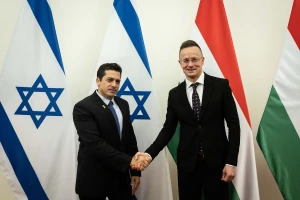'Wrong from the very beginning' - Hungarian minister blasts EU’s Israel policy

Hungary has positioned itself as one of Israel’s strongest allies within the European Union (EU). János Bóka, Hungary’s minister for European Affairs, criticized the EU’s Israel policy as “wrong from the very beginning” in an interview earlier this month with the Jewish News Syndicate (JNS). The EU has been sharply critical of Israel throughout the Gaza War, which began after Hamas attacked Israel, killing 1,200 people and abducting at least 250 on October 7, 2023.
“I believe that the European position has been wrong from the very beginning,” Bóka told JNS concerning the EU’s often hostile positions against Israel.
“This short sighted approach has tremendously contributed to the European Union being sidelined in the Middle East peace process in general,” Bóka said, adding, “It’s not a coincidence that the European Union is not at the table where things are decided. It’s not a coincidence that the European Union is not able to influence the political agenda anymore in the Middle East.”
“This is a natural consequence of the wrong policy choices that were made,” he assessed. Bóka explained why Hungary has embraced a different relationship with Israel. “We don’t want to contribute to further wrong choices being made on behalf of the European Union.”
In September, France, the United Kingdom, Canada, Australia and other Western nations unilaterally recognized a “Palestinian state.” Jerusalem and Washington criticized the diplomatic move as a de facto reward for Hamas terrorism.
Hungary had formally recognized “Palestine” as early as 1988, when the nation was under Communist control. The Hungarian minister addressed this diplomatic reality.
“In 1988, we recognized the Palestinian Authority as the representative of the Palestinians, exercising the right of self-determination,” Bóka said. “In our current understanding, this is not the recognition of a Palestinian state. This is the recognition of the Palestinian Authority as the agency representing the Palestinian people.”
The Hungarian minister stressed that Budapest believes the Western unilateral diplomatic recognition of “Palestine” does not advance genuine peace in the region, saying it "is not the beginning of the road. It’s the end of the road.”
“A premature recognition, when none of the legal and the factual prerequisites are there. I don’t think that this is conducive to regional stability,” Bóka added. “I believe that this is exactly the opposite way around. It’s a source of instability.”
Earlier this year, Italian Prime Minister Giorgia Meloni echoed similar sentiments when she explained why Rome has not joined the growing Western diplomatic recognition of “Palestine.”
The Hungarian minister argued that U.S. President Donald Trump’s 20-point Gaza ceasefire plan should be fully implemented before any potential diplomatic recognition.
“After this is implemented, then the issue of a future Palestinian state might arise somewhere in the distant future,” the minister argued. “For the time being, this is not a priority, and this is not something we should focus on.”
Bóka said that EU’s hostile policies toward the Jewish state are linked to the changing demographics in European countries due to mass immigration from Muslim-majority countries.
“There’s a very strong and direct link between ineffective migration policies and the changing political landscape,” he told JNS. “The very strong demographic tendencies change the fabric of European societies, and at some point, this is something that the political elite can no longer ignore.”
Bóka outlined Hungary's vision of relations between the EU and the State of Israel.
“The European Union needs to have a strategic and constructive relationship with the State of Israel. I believe that this is conducive to stability in the Middle East. I believe this is conducive to the strategic interest of the European Union on combating illegal migration, fighting terrorism, [and] providing for the energy security of Europe. These are areas where you cannot make any progress without cooperation with Israel,” he explained.
He also addressed the issue of rising antisemitism worldwide following Oct. 7.
“I believe in Hungary Jewish communities don’t feel that – and the majority [of Hungarians don't] think that Jewish communities should feel that in Hungary – but there’s a common understanding between Jews and non-Jews in Europe that the Jewish communities are in an existential crisis in Europe, and I think that these concerns are well founded,” he said.
Unlike countries such as Germany, Belgium, France, and Sweden, Hungary has maintained restrictive immigration policies toward arrivals from Middle Eastern and North African countries.
During a visit to Hungary last year, Israeli Diaspora Affairs and Combating Antisemitism Minister Amichai Chikli argued that Hungary is the safest country in Europe for Jews.
“It is Hungary’s robust conservative leadership that ensures Jews can walk through the streets safely, unlike in other European capitals, where, notably in London, Jews require armored vehicles for safe passage,” Chikli said.

The All Israel News Staff is a team of journalists in Israel.
You might also like to read this:











